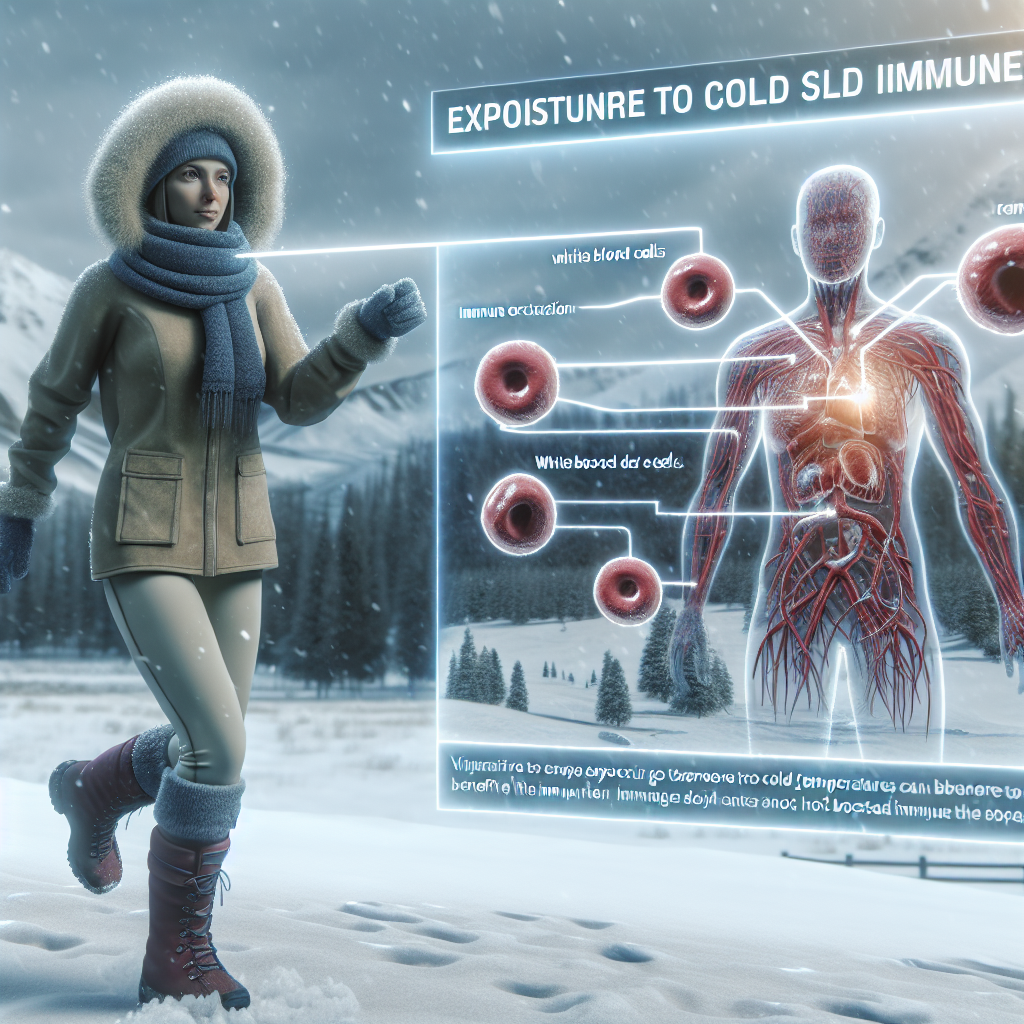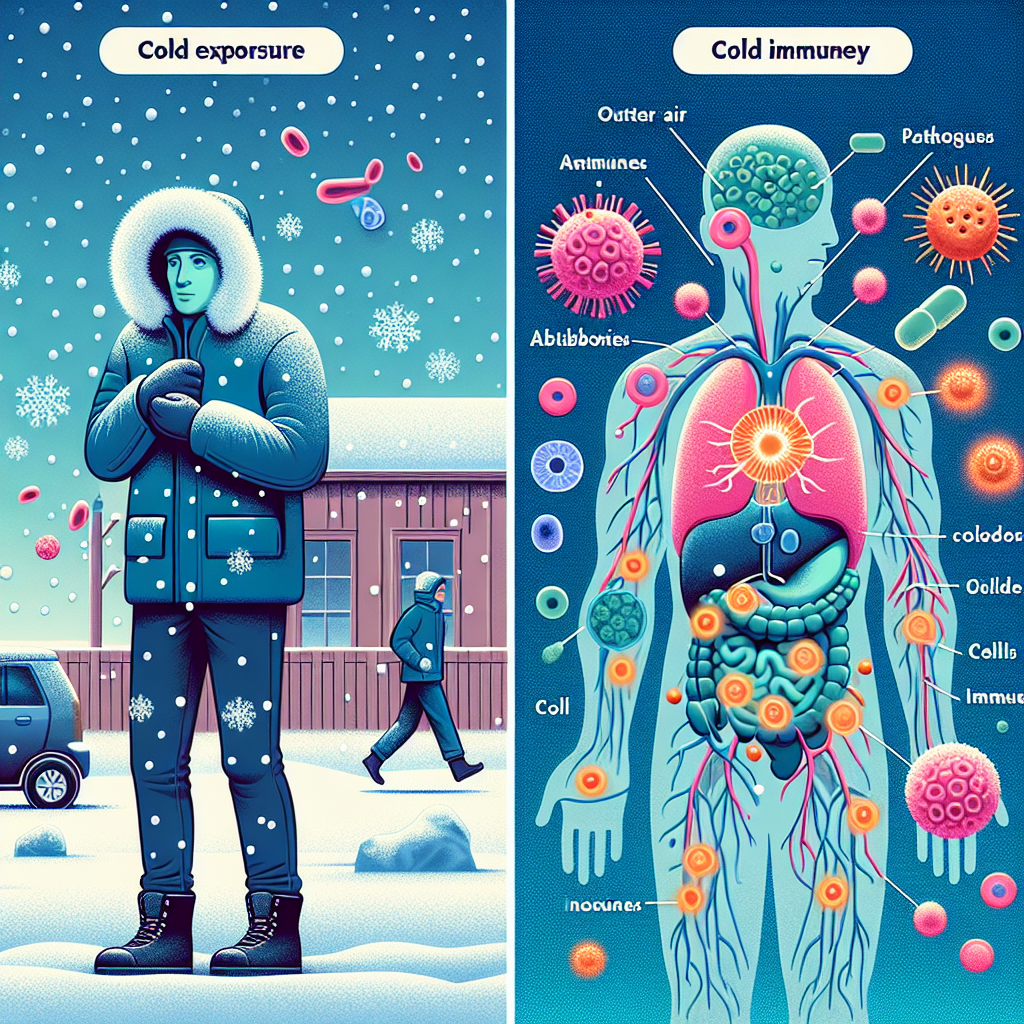How Cold Exposure Can Boost Your Immune System

Discover the amazing benefits of cold exposure and how it can boost your immune system. Learn more about this natural method and start your journey towards a healthier lifestyle. Click here to find out more.
Exploring the Benefits of Cold Exposure on Your Immune System
Cold exposure, a practice that has been around for centuries, is gaining renewed interest in the health and wellness community. This practice, which involves exposing the body to cold temperatures for short periods, has been linked to a host of health benefits, including improved mood, increased metabolism, and enhanced cognitive function. However, one of the most intriguing benefits of cold exposure is its potential to boost the immune system.
The immune system is our body’s first line of defense against disease and infection. It is a complex network of cells, tissues, and organs that work together to protect the body from harmful invaders. When the immune system is functioning optimally, it can effectively ward off pathogens and prevent illness. However, when the immune system is weakened or compromised, it can lead to increased susceptibility to infections and diseases.
Cold exposure can help to strengthen the immune system in several ways. Firstly, it stimulates the production of white blood cells, which play a crucial role in the body’s immune response. White blood cells are responsible for identifying and destroying harmful pathogens, and their production is often increased in response to stress or infection. Cold exposure acts as a form of mild stress that triggers the production of these cells, thereby enhancing the body’s ability to fight off infections.
Secondly, cold exposure can help to reduce inflammation in the body. Inflammation is a natural immune response to injury or infection, but chronic inflammation can lead to a host of health problems, including heart disease, diabetes, and cancer. Cold exposure has been shown to reduce levels of inflammatory markers in the body, which can help to prevent chronic inflammation and improve overall health.
Moreover, cold exposure can also stimulate the production of a type of immune cell known as a cytotoxic T cell. These cells are responsible for identifying and killing infected cells in the body, and their production is often increased in response to stress or infection. By stimulating the production of these cells, cold exposure can enhance the body’s ability to fight off infections and diseases.
While the benefits of cold exposure on the immune system are promising, it’s important to approach this practice with caution. Cold exposure can be uncomfortable and even dangerous if not done correctly. It’s recommended to start with short periods of exposure and gradually increase the duration as your body adapts. It’s also important to listen to your body and stop if you feel uncomfortable or unwell.
In conclusion, cold exposure can offer a natural and effective way to boost the immune system. By stimulating the production of white blood cells and reducing inflammation, it can enhance the body’s ability to fight off infections and diseases. However, it’s important to approach this practice with caution and consult with a healthcare professional before starting a cold exposure regimen. With the right approach, cold exposure can be a powerful tool for improving immune health and overall wellbeing.
Unlocking Health: How Cold Exposure Enhances Immune Function

In the quest for optimal health, many of us are constantly seeking new ways to boost our immune systems. One method that has been gaining traction in recent years is cold exposure, a practice that involves subjecting the body to low temperatures to stimulate various physiological responses. This practice, which can range from taking cold showers to ice baths or even winter swimming, is believed to have a host of health benefits, including enhanced immune function.
The human body is a complex system designed to adapt and respond to a variety of environmental conditions. When exposed to cold temperatures, the body initiates a series of responses to maintain its core temperature. These responses include constriction of blood vessels, increased heart rate, and shivering, all of which are aimed at generating heat. However, these are not the only changes that occur. Cold exposure also triggers a significant increase in the number of immune cells circulating in the body.
Research has shown that regular cold exposure can lead to an increase in the number of white blood cells, including lymphocytes and monocytes, which play a crucial role in the body’s immune response. These cells are responsible for identifying and eliminating pathogens, making them a key component of the body’s defense system. By increasing the number of these cells, cold exposure can potentially enhance the body’s ability to fight off infections.
In addition to boosting the number of immune cells, cold exposure also appears to stimulate the production of certain types of cytokines, which are proteins that play a critical role in regulating the immune response. Some of these cytokines have anti-inflammatory properties, which can help to reduce inflammation and promote healing. This suggests that cold exposure could not only boost the immune system but also aid in recovery from injuries and illnesses.
Furthermore, cold exposure has been found to activate the body’s sympathetic nervous system, often referred to as the “fight or flight” system. This activation leads to the release of norepinephrine, a hormone and neurotransmitter that has been shown to have a variety of effects on the immune system. Norepinephrine can stimulate the production of immune cells, enhance their activity, and modulate the inflammatory response, further contributing to the immune-boosting effects of cold exposure.
While the idea of immersing oneself in cold water or stepping into a cold shower may seem daunting, it’s worth noting that the benefits of cold exposure can be obtained even with relatively mild and brief exposures. Even a short, cold shower can be enough to stimulate the body’s adaptive responses and boost immune function.
However, it’s important to approach cold exposure with caution, especially for those with certain health conditions. Individuals with cardiovascular disease, for example, should consult with a healthcare provider before beginning a cold exposure regimen, as the practice can increase heart rate and blood pressure.
In conclusion, cold exposure represents a promising and accessible method for enhancing immune function. By triggering a series of physiological responses, it can increase the number of immune cells, stimulate the production of anti-inflammatory cytokines, and activate the sympathetic nervous system, all of which can contribute to a stronger and more resilient immune system. As we continue to explore and understand the myriad ways in which our environment influences our health, it’s clear that something as simple as the temperature of our showers could have a profound impact on our well-being.
Cold Showers and Winter Swims: Boosting Your Immune System through Cold Exposure
Cold exposure, a practice that may seem daunting to many, has been gaining popularity in recent years due to its numerous health benefits. One of the most significant advantages of this practice is its potential to boost the immune system. This article will delve into the science behind how cold showers and winter swims can enhance your immune response.
The human body is a complex system that has evolved over millennia to adapt to a wide range of environments and conditions. One of these adaptations is the body’s response to cold exposure. When the body is exposed to cold temperatures, it responds by increasing its metabolic rate to generate heat and maintain a stable internal temperature. This process, known as thermogenesis, not only helps to keep us warm but also stimulates various physiological processes that can enhance our immune function.
The immune system is our body’s primary defense against disease and infection. It consists of a network of cells, tissues, and organs that work together to protect the body from harmful pathogens. When the immune system is functioning optimally, it can effectively identify and eliminate these threats, keeping us healthy and disease-free. However, factors such as stress, poor diet, lack of sleep, and sedentary lifestyle can weaken the immune system, making us more susceptible to illness.
This is where cold exposure comes into play. Research has shown that regular exposure to cold temperatures can stimulate the immune system, enhancing its ability to fight off infections. One study found that people who took daily cold showers had a significantly lower incidence of sickness absence from work compared to those who took hot showers. The researchers suggested that this could be due to the immune-boosting effects of cold exposure.
Moreover, cold exposure can also increase the production of white blood cells, the body’s primary defense against disease. This is because the body responds to cold temperatures by increasing its metabolic rate, which in turn stimulates the production of these cells. Additionally, cold exposure can also stimulate the production of certain types of immune cells that have antiviral and anticancer properties, providing further protection against disease.
Furthermore, cold exposure can also have a positive impact on our mental health, which is closely linked to our immune function. Studies have shown that cold exposure can help to reduce stress and improve mood, both of which can have a positive impact on our immune health. This is because stress can suppress the immune system, making us more susceptible to illness. By helping to reduce stress, cold exposure can therefore help to boost our immune function.
In conclusion, cold exposure, through practices such as cold showers and winter swims, can have a significant impact on our immune health. By stimulating the body’s metabolic rate, increasing the production of white blood cells, and reducing stress, cold exposure can help to boost our immune function and protect us from disease. However, it’s important to note that cold exposure should be approached with caution, especially for those with certain health conditions. Always consult with a healthcare professional before starting any new health regimen.